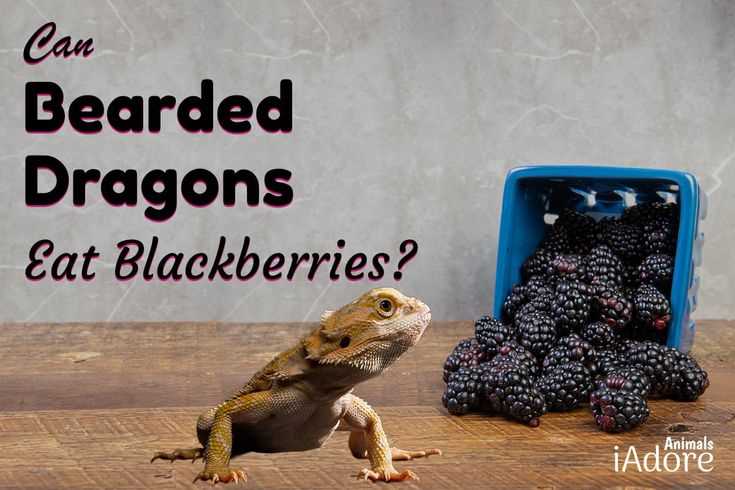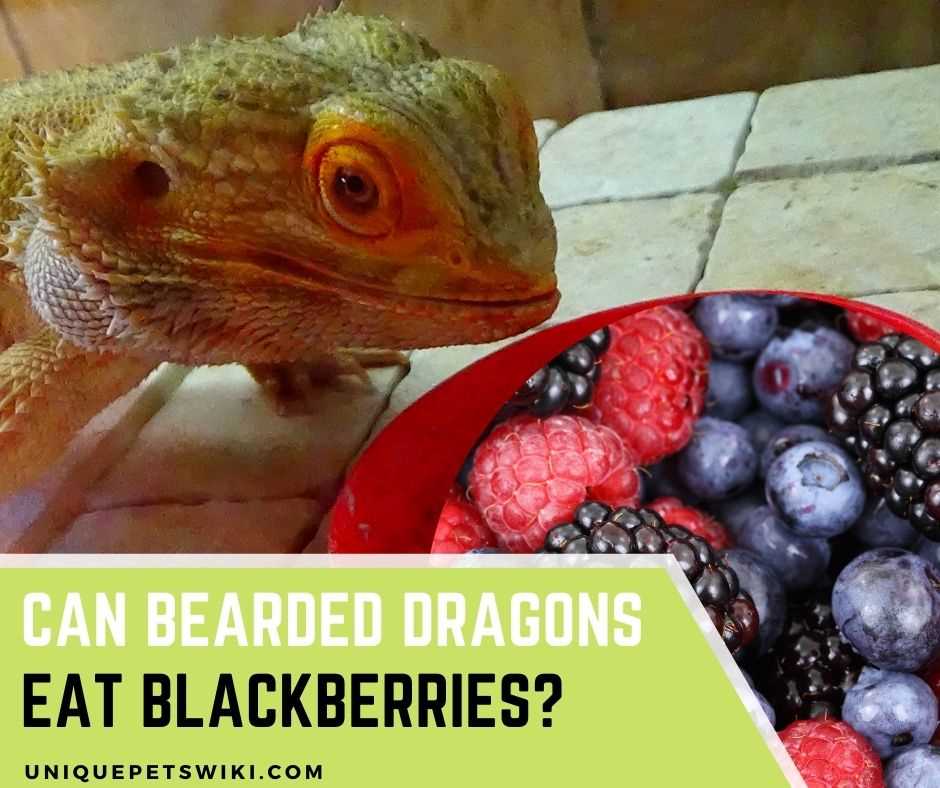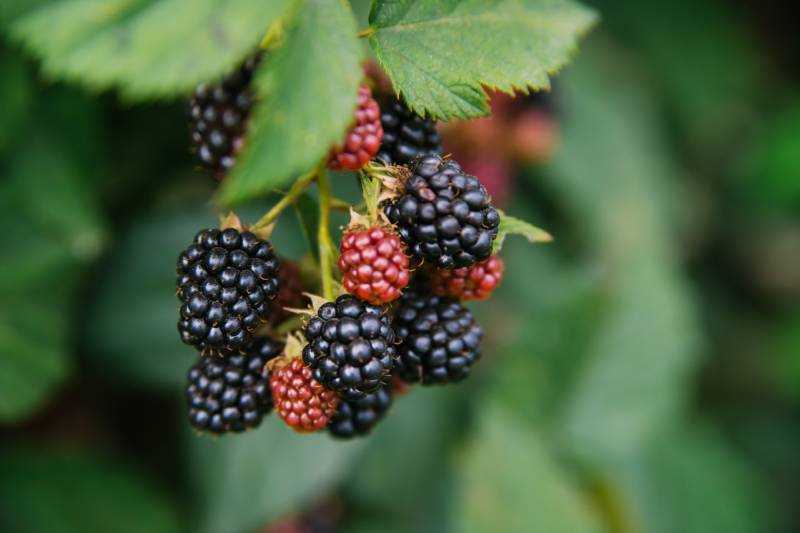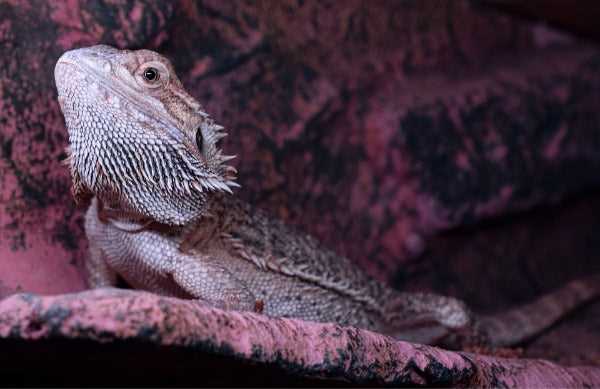
Bearded dragons are unique and fascinating reptiles that make popular pets for reptile enthusiasts. These extraordinary creatures require a well-balanced and nutritious diet to thrive. One question that frequently arises is whether blackberries are safe for bearded dragons to consume. Let’s delve into this topic and explore the potential benefits and risks of feeding blackberries to these reptiles.
So, can bearded dragons eat blackberries? While blackberries are not toxic to bearded dragons, they should be considered an occasional treat rather than a regular part of their diet. These reptiles require a diet that primarily consists of leafy greens, vegetables, and insects. The high sugar content in blackberries can lead to health issues such as obesity and digestive problems if consumed excessively.
The Importance of Diet in Bearded Dragons
In order for bearded dragons to thrive and maintain good health, it is vital to provide them with a balanced and nutritious diet. As omnivorous creatures, bearded dragons have specific dietary requirements that need to be met for their overall well-being.
Dietary Needs
Bearded dragons require a varied diet that consists of both insects and plant matter. This is because they need a combination of protein, vitamins, minerals, and fiber to support their growth and development.
- Protein: Insects such as crickets, mealworms, and roaches are excellent sources of protein for bearded dragons. Protein is essential for muscle development and maintenance.
- Vitamins and Minerals: Bearded dragons require a wide range of vitamins and minerals for proper functioning of their body systems. Leafy greens like kale, collard greens, and dandelion greens are great sources of these nutrients.
- Fiber: Fiber aids in digestion and helps prevent constipation in bearded dragons. Including vegetables like carrots and squash, as well as fruits such as apples and berries, can provide the necessary fiber for their diet.
Benefits of Including Blackberries
- Antioxidants: Blackberries contain antioxidants that help neutralize harmful free radicals in the body. This can contribute to reducing the risk of oxidative stress and promote a healthy immune system in bearded dragons.
- Vitamins: Blackberries are a good source of vitamins A and C, both of which are essential for maintaining the health of a bearded dragon. Vitamin A promotes good eye health and helps with skin regeneration, while vitamin C is important for boosting the immune system.
- Minerals: Bearded dragons require minerals like calcium and phosphorus for strong bones and proper nerve function. Blackberries contain small amounts of these minerals, contributing to the overall mineral balance in a bearded dragon’s diet.
The digestive system of a bearded dragon consists of several organs that work together to break down and absorb nutrients from their food. Here is a brief overview of how their digestive system functions:
- Mouth and Teeth: Bearded dragons have a wide mouth and sharp teeth, which they use to bite and chew their food. Properly chewing their food is important for the overall digestion process.
- Esophagus: After chewing, the food moves down the esophagus, a muscular tube that connects the mouth to the stomach.
- Stomach: The food enters the stomach, where it is mixed with stomach acid and digestive enzymes. This helps break down the food into smaller particles.
- Small Intestine: From the stomach, the partially digested food enters the small intestine. This is where the majority of nutrient absorption takes place.
- Large Intestine: After passing through the small intestine, any remaining undigested food enters the large intestine. Water is absorbed here, and the waste material is formed into feces.
- Cloaca: The cloaca is the common exit point for the digestive and urinary systems. Feces are eliminated through the cloaca.
Introducing blackberries to a bearded dragon’s diet
Blackberries are a nutritious and delicious treat that can provide bearded dragons with additional vitamins and minerals. They are packed with antioxidants, fiber, and essential nutrients like vitamin C, vitamin K, and manganese. These nutrients are important for maintaining a bearded dragon’s overall health and well-being.
Before feeding blackberries to your bearded dragon, make sure they are thoroughly washed to remove any pesticides or chemicals that may be present on the skin. It is recommended to offer organic blackberries whenever possible to minimize exposure to harmful substances.
Serving blackberries to your bearded dragon can be done by either offering them whole or cutting them into small, bite-sized pieces. Some bearded dragons may prefer mashed blackberries, while others may enjoy the challenge of picking them up and eating them whole. Offer the blackberries in a shallow dish or place them on the floor of the enclosure for easy access.
Remember to always monitor your bearded dragon’s health and behavior when introducing any new food to their diet. If you notice any signs of discomfort, illness, or digestive issues, it is best to consult a veterinarian for proper guidance.
Nutritional benefits of blackberries for bearded dragons
Blackberries can be a valuable addition to a bearded dragon’s diet due to their rich nutritional profile. These berries are packed with essential vitamins, minerals, and other beneficial compounds that can support the overall health and well-being of your pet.
Vitamins: Blackberries are a great source of vitamin C, which is vital for the immune system function and helps in wound healing. They also contain vitamin A, which is important for maintaining healthy vision and supporting proper growth in bearded dragons.
Minerals: Blackberries are rich in minerals such as calcium and potassium. Calcium is crucial for the development and maintenance of strong bones and teeth, while potassium is essential for proper nerve and muscle function.
Fiber: These berries are an excellent source of dietary fiber, which can aid in digestion and help prevent constipation in bearded dragons. Fiber also promotes a healthy gut microbiome and supports overall digestive health.
Antioxidants: Blackberries are loaded with antioxidants, including anthocyanins, which give them their dark color. Antioxidants help protect the body against oxidative stress and reduce the risk of chronic diseases.
Hydration: Blackberries contain a high water content, which can help hydrate your bearded dragon. Adequate hydration is important for maintaining proper organ function and preventing dehydration.
The Potential Risks of Feeding Blackberries to Bearded Dragons
Possible Digestive Issues

One potential risk of feeding blackberries to bearded dragons is that they may cause digestive issues. Blackberries are high in fiber, which can be beneficial for digestion in moderate amounts. However, excessive consumption of blackberries can lead to diarrhea or an upset stomach in bearded dragons.
High Sugar Content
Blackberries are naturally sweet and contain a relatively high amount of sugar. While a small amount of natural sugars can be a healthy part of a bearded dragon’s diet, excessive sugar intake can lead to obesity, diabetes, and dental problems in bearded dragons.
Pesticide Contamination
Allergy or Sensitivity
Just like humans, bearded dragons can develop allergies or sensitivities to certain foods. It is possible that a bearded dragon may have an adverse reaction to blackberries, such as an allergic reaction or digestive upset. If you notice any unusual symptoms or behaviors after feeding your bearded dragon blackberries, it is best to discontinue feeding them and consult with a veterinarian.
How to prepare blackberries for bearded dragons
1. Start by selecting fresh and ripe blackberries. Avoid using any that are overripe or moldy.
2. Wash the blackberries thoroughly with water to remove any dirt or pesticides. Be sure to use plain water and avoid using any soap or chemical cleaners.
3. Gently pat the blackberries dry with a clean towel or paper towel.
4. Using a sharp knife, slice the blackberries into smaller, bite-sized pieces. This will make it easier for your bearded dragon to eat and digest them.
5. Remove any seeds or pits from the blackberries. While the seeds are not harmful, they can be difficult for bearded dragons to digest.
6. Place the prepared blackberries in a dish and serve them to your bearded dragon.
Recommended Feeding Guidelines for Blackberries for Bearded Dragons
1. Introduction Phase:
Before introducing blackberries to your bearded dragon, it is essential to ensure that they are at least six months old and their digestive system is fully developed. Younger bearded dragons may not be able to digest blackberries effectively, leading to digestive issues.
2. Quantity:

Blackberries should be fed to bearded dragons as an occasional treat rather than a regular part of their diet. It is recommended to offer blackberries to your bearded dragon once or twice a week, in small quantities. Overfeeding blackberries can lead to stomach upset and diarrhea, so it’s crucial to monitor their intake.
3. Size and Preparation:
Before feeding blackberries to your bearded dragon, make sure to wash them thoroughly to remove any dirt or pesticides. Additionally, it is essential to cut blackberries into small, bite-sized pieces, as large pieces could pose a choking hazard. Bearded dragons have small mouths and can have difficulty swallowing large food items.
4. Variety in Diet:
By following these recommended feeding guidelines for blackberries, you can safely incorporate this tasty fruit into your bearded dragon’s diet. Remember to monitor their reaction to blackberries and make adjustments to the feeding routine if any digestive issues occur. Always prioritize the health and well-being of your beloved bearded dragon.
Alternative Foods for Bearded Dragons
1. Leafy Greens
Leafy greens should make up the majority of a bearded dragon’s diet. Good options include collard greens, mustard greens, dandelion greens, and kale. These greens are rich in vitamins and minerals essential for the health of your bearded dragon.
2. Vegetables

Offer a variety of vegetables such as bell peppers, carrots, squash, and zucchini. These veggies provide essential nutrients and fiber that are beneficial for your bearded dragon’s digestive system.
3. Fruits
In addition to blackberries, you can also feed your bearded dragon small amounts of other fruits like strawberries, blueberries, and apples. Fruits are a good source of hydration and natural sugars.
4. Insects
Bearded dragons are omnivores and require animal protein in their diet. Offer them a variety of insects, such as crickets, mealworms, and dubia roaches. These insects provide essential nutrients like protein and calcium.
5. Pelleted Diets
Pelleted diets specifically formulated for bearded dragons can be a convenient option and ensure that your pet receives all the necessary nutrients. Look for high-quality, commercially available pellet brands.

I’m Lena Adams—a product of an unconventional upbringing in the African wilderness. My father, a daring explorer of African wildlife, sparked my fascination with reptiles, a passion that intertwined with the tragic loss of my mother during an expedition, leaving an indelible mark on my life. Driven to understand the creatures that captivated my parents, I embarked on my journey, sharing insights about reptiles, frogs, and lizards on my website. Through my explorations and conservation efforts, I honour my family’s legacy while seeking connections—to the creatures, nature, and the mother whose presence I yearn to understand.
